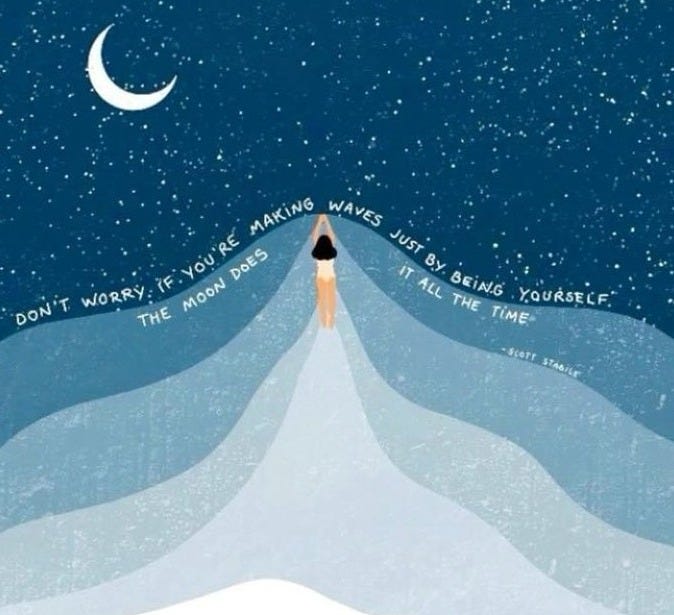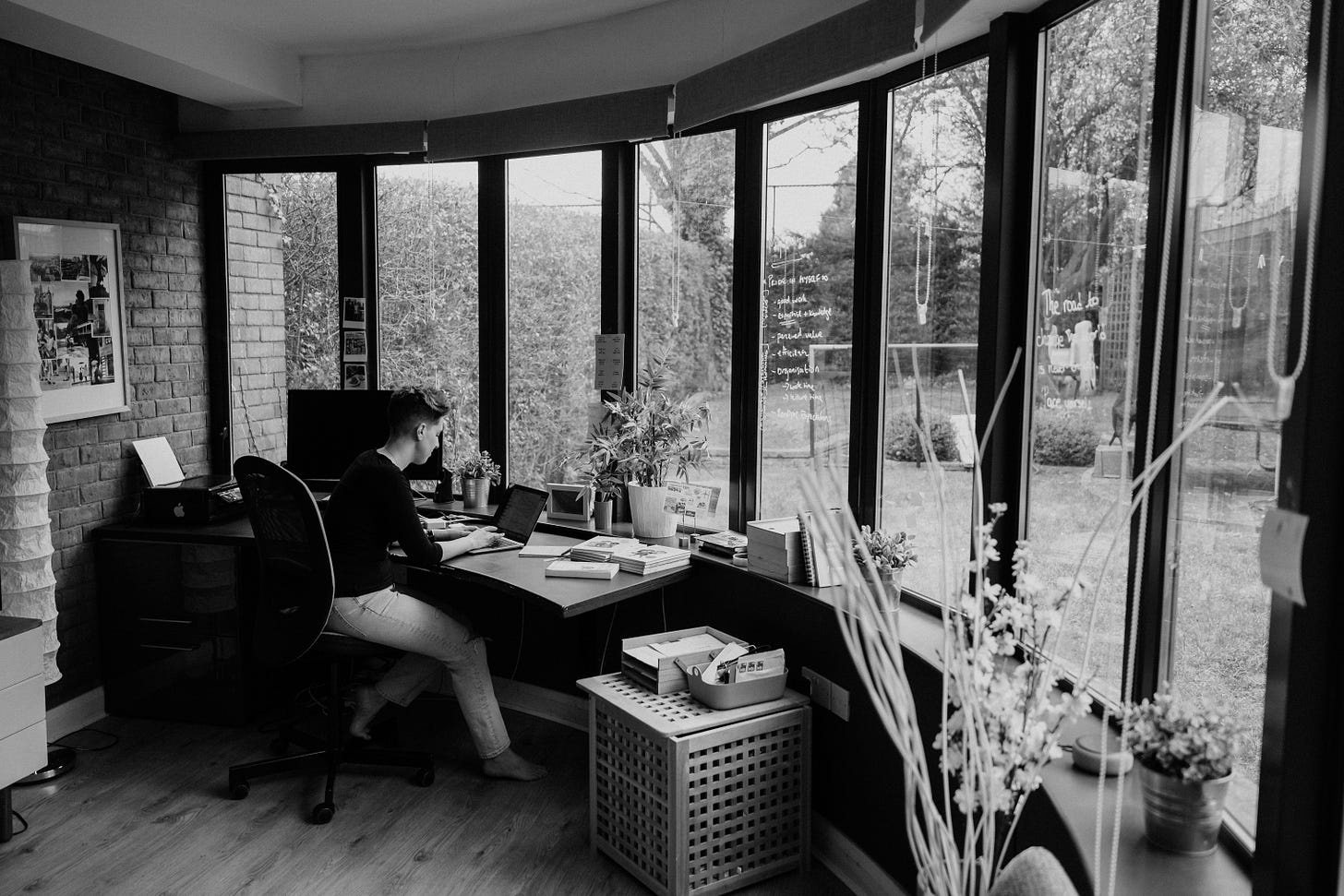Parents that Write: #8 Q&A with Virginia Mendez
BRING IT: A fresh lens on the creative life
Welcome to my weekly interview column.
When conversation turns to parent creatives - writers and artists, especially mothers - the focus often shifts to the chaos and supposed impossibility of juggling creativity with parenthood.
—> Let’s CUT THE NOISE:
Parents publish books, drop albums, get screenplays optioned, and pour their souls into poems every single day.
How do they do it? That’s what we’re here to uncover.
I’m delighted to showcase talented parent-writers and creators as they answer eight bite-size questions, plus a few more they pick from a juicy list I send their way.1.
But before we meet today’s guest, here’s a peek behind the scenes of my own creative life.
No-Fluff Notes from my Writing Life
As we reach Week 8 of this column, it feels like the right moment to take stock of what I’ve shared so far. Writing this has been a way for me to reflect on the ups and downs of my creative journey. Hopefully, I’m offering a glimpse into the reality behind the scenes of bringing my motherhood book to life.
For those who’ve been following along (thank you!), this recap might jog some memories. For newcomers, ~ welcome ~ it’s a chance to catch up on the story so far. Let’s revisit what’s been covered:
1. Island Retreat & Writing Process (Week 1-2): It all started with my impulsive Twixmas decision to visit a remote island where J.M. Barrie wrote Peter Pan. Juggling kids, no internet, and the demands of writing seemed impossible. But the Neverland time led to unexpected creative breakthroughs. By the end, I’d carved out much-needed clarity on the direction of my motherhood book.
2. Struggles with Publisher Expectations (Week 3-4): I found myself with two publishers keen for the book. Each wanted to steer it in different directions that didn’t quite align with my vision. It was the space of being disconnected from the world on the island that gave me the courage to choose my own path and reject those offers, despite how tempting they seemed.
3. Decision to Self-Publish (Week 5-6): Inspired by bold publishing moves made by Anaïs Nin, I decided to launch my own imprint. This gave me full creative control over the book. This decision came with challenges. Self-publishing felt like the only way to stay true to my voice and messages about motherhood.
4. Creative Reframing & Flow (Week 7): One of the biggest shifts in my writing process came from a simple reframing exercise. By telling myself I wasn’t writing a book, but a pamphlet, I released pressure and allowed creativity to flow. This practice helped me break through mental blocks that often accompany big projects.
Throughout the weeks, some themes surfaced ~ key lessons that have shaped my writing process and decision-making. Here’s a quick look at these recurring themes:
⏩ Creative Breakthroughs through Immersion: Removing ordinary distractions and ‘fully immersing myself’ in the writing process has been key to finding clarity. The island retreat with a brood of kids was a prime example of this.
⏩ Staying True to Your Vision: I’ve continually faced the challenge of external pressures (publishers, expectations), but I’ve learned that staying authentic to my vision is worth more than any deal or commercial success.
⏩ Embracing the Unknown in Self-Publishing: Taking control of my book through self-publishing wasn’t the easier choice, but it has been the most liberating. The freedom to shape my own narrative has been empowering.
⏩ Managing Creative Anxiety: Reframing daunting tasks into something smaller and more manageable has become an essential practice for me, helping me move forward when fear threatens to stall progress.
I’ll share more insights in the coming weeks, but I hope this recap gives a helpful reflection on what’s been explored so far. Feel free to revisit any of the previous entries through the links, and I’d love to hear what resonates most with you!
My guest today writes & publications.The golden thread between the two is Virginia’s commitment to challenging and deconstructing societal norms, particularly around gender. Both publications explore how gender biases shape our lives.
Her goal (in basic terms) is to foster a more equitable and conscious approach to both personal growth and parenting, encouraging readers to question and redefine traditional gender roles.
Share a broad snapshot of your life. Who are you parent to and/or have caring responsibilities for?
I am Virginia, Spanish woman living in Northern Ireland, mother of 2 and professional feminist. All my jobs (author, speaker, trainer, consultant) are rooted in my passion for intersectional feminism.
My kids are 6 and 8, and because my parents live in another country parenting has looked very different, in terms of help and support, than I imagined.
Where can we find you?
Linkedin | Instagram | Calls | Childhood Unlimited Substack
Can you share favourite praise for your writing, or words you’d love to read about your work?
Someone said about my last post that it was a massage for the brain! I like the idea of being thought provoking and articulate but still writing in a way that is beautiful, that makes you FEEL
Why do you write?
Because I exist in words, I think, dream, plan and feel in words and I need them out to make sense of it all.
What does the inside of your writing mind look like?
Cosy, and exciting. Writing is like opening a present, I don't know really what is going to happen until I am in front of the paper and start... It feels authentic.
How is your ability to write affected by being a parent and your ability to parent affected by your writing?
They have both been very intertwined, even if I have always written. My three books have been severely shaped by the fact that I am a mother (a parenting book "Childhood Unlimited: Parenting beyond the gender bias" and 2 children’s books, one about consent and one about gender equality).
The fact that writing is my time to stop and think it makes my parenting more intentional, as I can explore with myself what are my feelings/thoughts about certain topics. Also, I have my writing as a way to be with myself which allows my mental health that translates into my parenting.
How often do you write with your children around or not, and what kind of writing do you get done when your child/ren are nearby?
Depends on how I am and how they are. Sometimes I am writing while getting them to bed, or if they are playing around and if I am inspired it doesn't matter.
Others I am trying to figure something out and the noises stop me from connecting with the ideas. I try to be flexible and realistic.
What is your best writing habit and how did you discover it?
Trust your capacity to write. Since I have this commitment with Substack I have to trust that during the week I will find it in my schedule to write something that I am happy enough to share with the world. And it happens. The consistency is key.
What are the three most important characteristics of being a writer who is a parent?
- Self awareness. Know what works for you. IF it is routine, knock yourself out, if it is not, free flow. Trust it.
- Determination. Don't give up.
- Compassion. For you, for your writing, for your kids... all is connected, you will fail at times, this is ok.
What or who is your secret writing weapon?
HAVING to write. I just feel that writing is connected with who I am, always has. Writing is just another part of me, and just like me it keeps evolving.
What or who has been the most significant creative influence in your life?
Conversations. I have a list of notes in my phone of things that made me think or feel during a conversation. I get genuinely excited about exploring on the paper
You’re a writer: name 3 of your procrastination techniques.
- Whatsapp. There is always a friendship to nurture.
- Work things that I know that are not urgent OR important but are easy to take from the '"to do list" and gives me a sense of achievement, even if false
- House and kids related things, black hole time and the mother of all excuses to procrastinate in the name of "I had to".
If your writing discipline was a food, what would it be?
Rice, with tomato and egg fried. Comfort food. Doesn't have to make sense for anyone else but does for a lot of people (it is really popular in Spain). I see my discipline more like a comforting scape and opportunity than a strict diet.
What unfinished writing projects do you have lying about?
1. There is a novel based on a real character that I know could be great.
2. There is a kids story that I playfully started writing with my kids that looked fun and I would lile to pick up some time.
3. There is the list of topics that will feed my substack that I carry with me
4. The other day in a concert I had an idea of another story to tell, well, more like different stories linked
5. And finally I am working on a TV script wih some friends!!!
Share a picture of what ‘A Room of One’s Own’ means to you.
An Encore
"Writing is like sex. First you do it for love, then you do it for your friends, and then you do it for money".-- Virginia Woolf
In what ways is writing like sex, for you? I’ll answer in the comments section, do me a favour, don’t leave me hanging there alone 😁
What did you enjoy most from this week’s column with Virginia?
Drop your thoughts in the comments below. Let’s chat!
To read guest the full list of questions read this interview












I love the question. Writing, like sex, when done right feels liberating, important and needed. Everything else dissapear. Writing, like sex, when done wrong, feels forced, clunky and cringe. In both cases trying to enjoy it rather than focusing on an external perfomance review is good advice. In both cases there can be huge pleasure both in the shared experience and in doing it alone, just for yourself.
Writing and sex: to stand naked at the crossroads and to recognize that the unknown is hot, that possibility is sexy. And when we imagine the transformation from body to page, we understand that to desire and to write are one and the same.